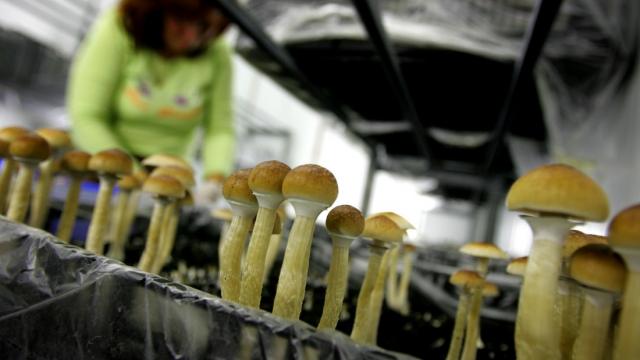
Earlier this month, Denver citizens voted on Initiated Ordinance 301, also known as the Denver Psilocybin Mushroom Initiative. Although the official results won't be made available until the end of this week, the remaining uncounted votes will not be able to sway the results: The vote passed by less than 2,000 votes, with 50.5 percent supporting the ordinance and 49.4 percent against.
To be clear, psilocybin mushrooms are still illegal. That is, it's illegal to possess, use or distribute psychedelic mushrooms. However, with the passage of this law, use of the mushrooms is now decriminalized as the ordinance will “prohibit the city from spending resources to impose criminal penalties.” Put bluntly, Ordinance 301 seeks to make the “personal use and personal possession of psilocybin mushrooms the lowest law enforcement priority in [Denver].”
The ordinance, which applies to adults 21 and older, wasn't simply a referendum. It codifies into law that these substances will no longer be a priority for law enforcement and that people will no longer go to jail for possession. Additionally, the city will establish a review panel to report on the effects of the ordinance.
The narrow vote signals a significant shift in perspective – and insight – into personal, nonviolent drug use. It should also be seen as a harbinger of what's to come: a more progressive, compassionate and humane approach to drug policy in the United States overall.
Another important implication of the ordinance, which has been largely overlooked, is that scientists can now more freely conduct research on the mushrooms and psychologists can run experiments to explore their potential mental health uses. Johns Hopkins University is leading the nation in this research, and what their scientists are finding appears very promising – so much so that the university has recommended reclassifying psilocybin as a Schedule IV drug in order to actively pursue its medical potential.
Renowned author Michael Pollan, whose latest book is "How to Change Your Mind: What the New Science of Psychedelics Teachers Us About Consciousness, Dying, Addiction, Depression, and Transcendence," has an article in The New Yorker entitled “The Trip Treatment” in which he writes about the way that terminally ill cancer patients took guided psychedelic trips with trained psychologists and faced their mortality in new, illuminating ways. Many felt their “ego dissolve” and lost their fear of death. Other studies saw an immediate reduction in depression and anxiety for up to eight months in patients with advanced cancer using psilocybin.
Research into psychedelics is not new. In fact, throughout the 1950s and 1960s, LSD and psilocybin were used in (albeit poorly designed, by today’s standards) clinical trials to explore alcoholism, OCD, depression, anxiety, creativity and spirituality. The scientific community at the time was ecstatic with the potential of these substances to help better understand difficult mental disorders.
But all the excitement and research was effectively shut down in 1970 when President Nixon signed the Controlled Substances Act, which labeled most psychedelics (along with cannabis) as Schedule 1 drugs with “no currently medical use and high potential for abuse”. In most cases it's a felony to use or possess these substances, which of course contrasts with Schedule IV drugs that have “low potential for abuse and low risk of dependence.” Some examples of Schedule IV drugs include Xanax, Valium, Ativan, Ambien and Tramadol.
We now know that labeling drugs in tiers of “schedules” is a faulty political measurement to say the least – unsubstantiated, namely, because psychedelics like LSD and psilocybin are essentially non-toxic, non-addictive, and contain no known lethal dose. However, other drugs listed as Schedule IV such as Xanax, Valium, and Ambien possess all three of those characteristics: they are toxic, they are addictive, and if you take enough of them, you will die.
Fortunately we have already seen a mainstream embrace of the medicinal properties of cannabis, which has convinced 33 states and Washington, DC to legalize medicinal marijuana. The values and perspectives instilled in these compounds go directly against traditional, institutional values, therefore we shouldn't expect a rational response from our government despite what science and the will of the citizenry says.
The short of it is this: Individuals shouldn't go to jail or have their lives destroyed by an outdated legal system simply for possessing or using substances that bring no harm to others. Denver voters are brave in acknowledging that our current drug policy is destroying millions of lives, particularly citizens of color.
With the passage of the ordinance, Denver is leading the nation once again – not towards a society that necessarily condones the use of controlled substances, but one that approaches drug policy humanely, compassionately and honestly, unencumbered by greedy behemoth industries, paranoid governments and distorted logic and science.
Humans are on the verge of an exciting renaissance to better understand the human psyche. If Americans open their hearts and minds to the prospect of using these powerful drugs in controlled settings, we may see an exciting breakthrough for understanding and dealing with mental illness.
That embrace couldn't be more timely, with major depression, anxiety, gun violence and suicide rates all disturbingly on the rise nationwide. With America desperately in need of a cure to its growing malaise, psilocybin may be key to unlocking the door – and Denver is bravely stepping through.













